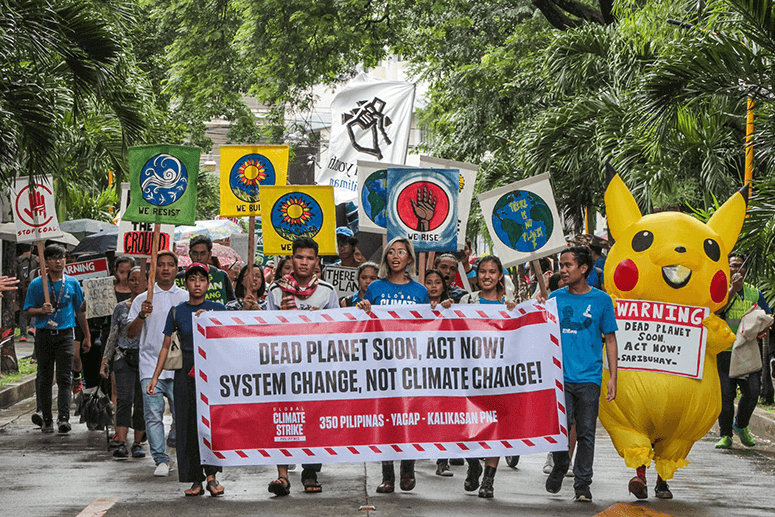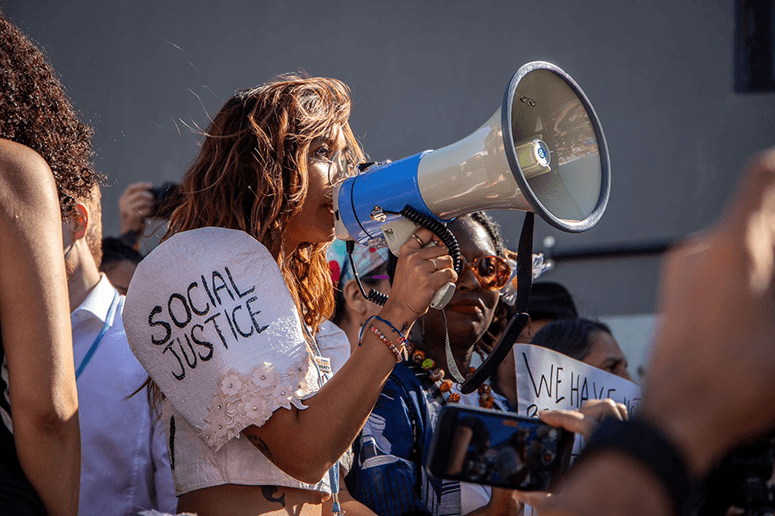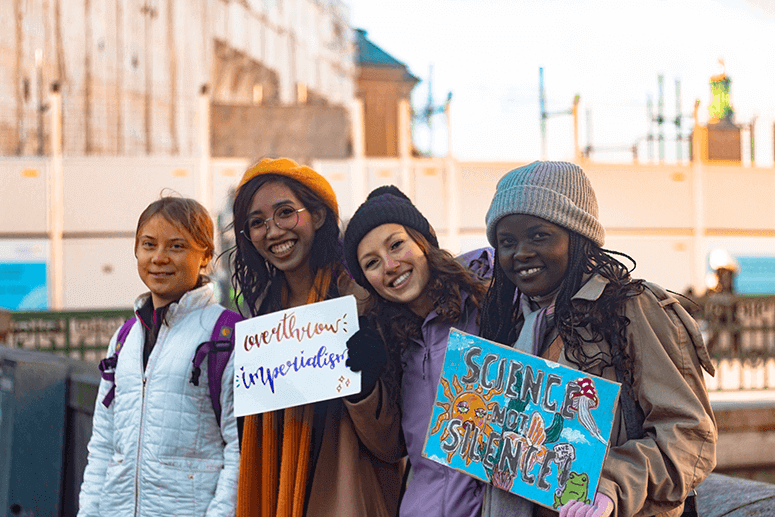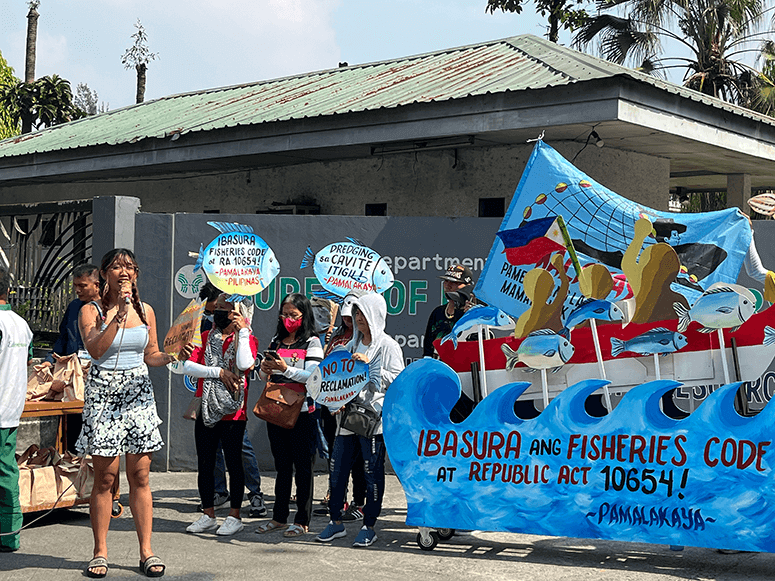The truth about fighting for climate justice
Yolanda, Ondoy, Pepeng, Pablo, Ulysses, Odette, and Paeng.
These are some names that have been ingrained in our collective memory as Filipinos—the names of supertyphoons that devastated our country, uprooted entire communities, and destroyed families. The Philippines is one of the most climate-vulnerable countries in the world, so it’s no surprise that a recent study shows Filipino youth are among the most prone to climate anxiety.
With the ongoing climate crisis, how can we not be? This fear of the uncertain future, rooted in trauma caused by these intensifying extreme weather events, is fueled further as world leaders continuously ignore scientists, activists, and the lived experience of those impacted by the climate crisis. These so-called leaders continue to avoid and delay concrete action to rapidly phase out fossil fuels, end fossil fuel finance, and drastically cut down emissions.

The Philippine government says that addressing climate change is its priority, yet it allows the continuous destruction of our environment through reclamation projects, megadams, and large-scale mining. These projects destroy important carbon sinks that could help mitigate the climate crisis, making it more difficult for us to adapt. They say it’s all in the name of development, but development for whom? Coastal communities and small fisherfolk, Indigenous Peoples, small farmers, and urban poor communities are all bearing the brunt of both the impact of these environmentally destructive projects and the impact of the climate crisis. Heatwaves and droughts continue to intensify and threaten our people’s health and our nation’s food security. Sea level rise is projected to consume large parts of the Philippines well within our lifetimes.
We have been force-fed the narrative that Filipinos are resilient and that we’re doing such a great job at surviving these extreme weather events; as if it’s our individual responsibility to protect ourselves from this harm. In reality, what we need is to move away from individual blame and resilience and towards infrastructural and systemic resilience.

We cannot keep on being praised for merely surviving. It is time for us to turn that narrative of individual resilience into collective resistance. Filipinos have always fought back. We have a long history of this by activists, civil society, and environmental defenders—these are our small fisherfolk, small farmers, and Indigenous Peoples.
Bazoo de Jesus, Dexter Capuyan, Mary Joyce Lizada, and Arnulfo Aumentado.
These are some of the names that have been ingrained in the hearts of vulnerable communities but generally forgotten by the rest of us—the names of environmental defenders and Indigenous rights advocates who have recently been abducted and disappeared. We must remember their names and support the call to surface all desaparecidos.
In reality, what we need is to move away from individual blame and resilience and towards infrastructural and systemic resilience.
In 2017, during Lakbayan, an annual march by Indigenous Peoples from their ancestral lands to Manila, I took one step into activism, not fully understanding the fears and risks that came along with it. I talked to a Lumad Indigenous leader who told us how they were being harassed, displaced, militarized, and killed, all for protecting the forests and mountains; their ancestral land; our planet. He shrugged, chuckled, and said, “That’s why we have no choice but to fight back.” It was so simple. He wasn’t even trying to convince us—to him it was logical. It simply made sense to be an activist.
It was that moment that set me on a path towards joining a mass organization called Agham Youth (AY), which advocates for making science and technology serve the people. AY later became one of the founding organizations of the Youth Advocates for Climate Action Philippines (YACAP) alliance. YACAP now has over thirty member organizations across the Philippines and five chapters for hundreds of young individuals in North-Central Luzon, NCR, South Luzon, Visayas, and Mindanao.

We’re not doing this alone and we never have to do this alone. Climate justice is about fighting for our community; for a chance to build and create that community; to make sure that everyone has access to a community that is safe.
Climate justice isn’t just about the environment or lowering carbon dioxide emissions or limiting global warming to an average of 1.5 degrees Celsius—the climate crisis is a symptom of the current destructive profit-oriented system that does not respect the physical limits of the planet and completely disregards the well-being of the majority of people who live in it.
Climate justice means recognizing how different socioeconomic problems are exacerbating the climate crisis and are exacerbated by the climate crisis. Climate justice is about fighting for life, in every sense of the word. Life as in living beings, for life as in forever, but also for a chance to live, truly live, with joy, safety, and intention.
Climate justice is about fighting for life, in every sense of the word. Life as in living beings, for life as in forever, but also for a chance to live, truly live, with joy, safety, and intention.
Six years later, I still get scared, because of both climate anxiety and the fear brought by activists being called terrorists. Something within me—something greater than fear—keeps me going. When everything feels hopeless and grim, I remember the strength of the people’s movement. I remember how empires, colonizers, and dictators have fallen in the past through young revolutionaries fighting alongside the most marginalized sectors. The future that we are fighting for already exists in small pockets of resistance.

I am grounded and rooted in this reality and in my love for life, the people, and the planet. We must be bound in this fight by that love that is stronger than fear—a fear that, at its core, is also rooted in our love: the fear of losing what we love. It is through this relentless love that hard decisions are made. It is through love that we stick to these difficult tasks. It is through love that revolutions are won.
Each of us has a role and a place in the movement, and I invite everyone to choose love, to choose life, and to fight alongside us for climate justice.


